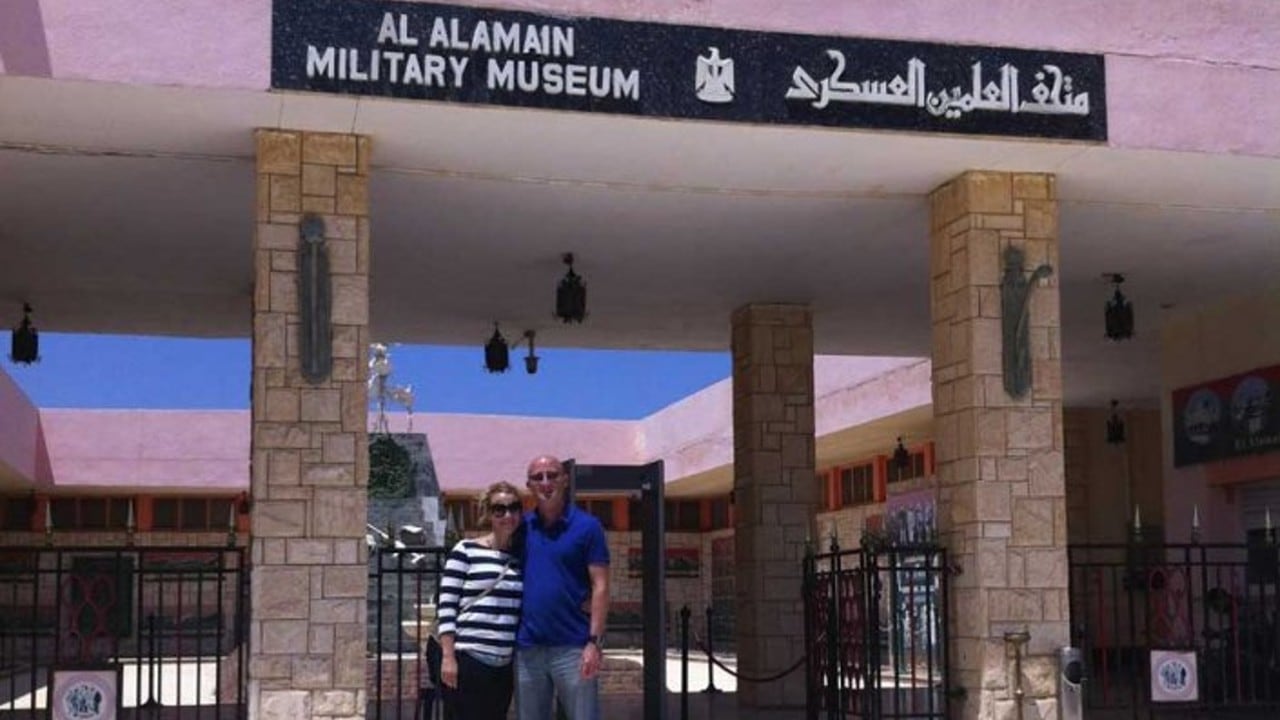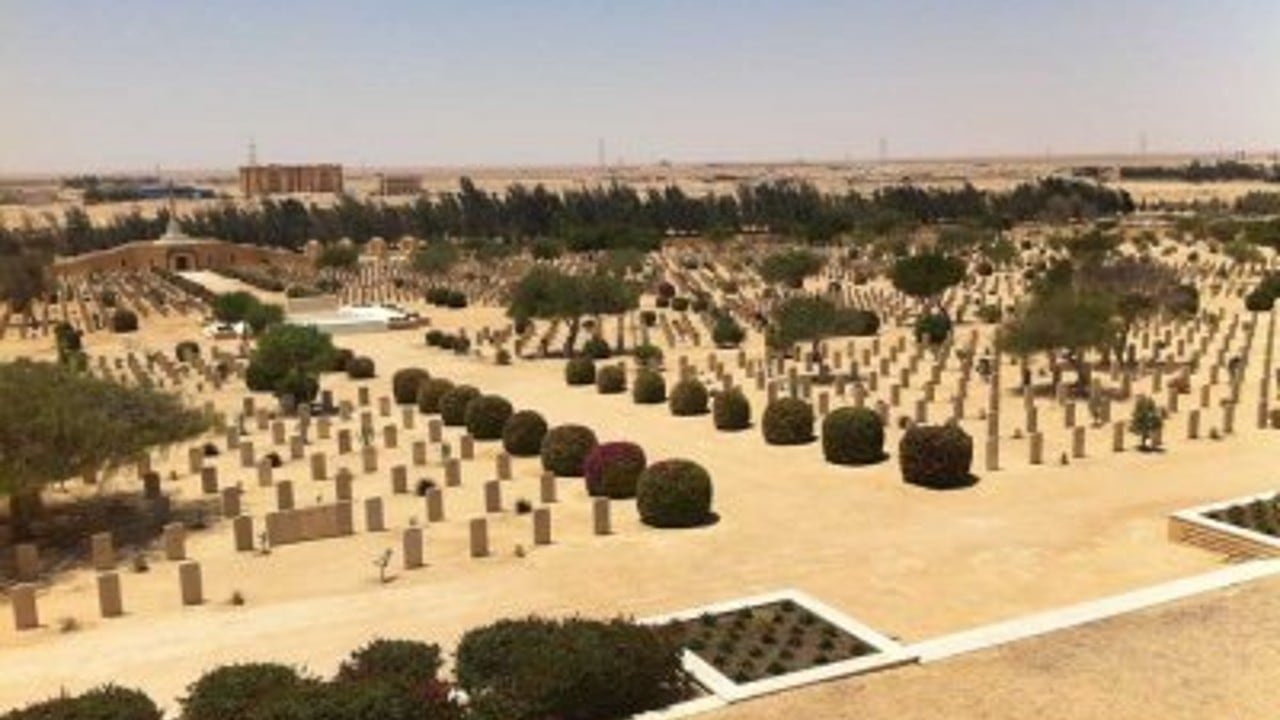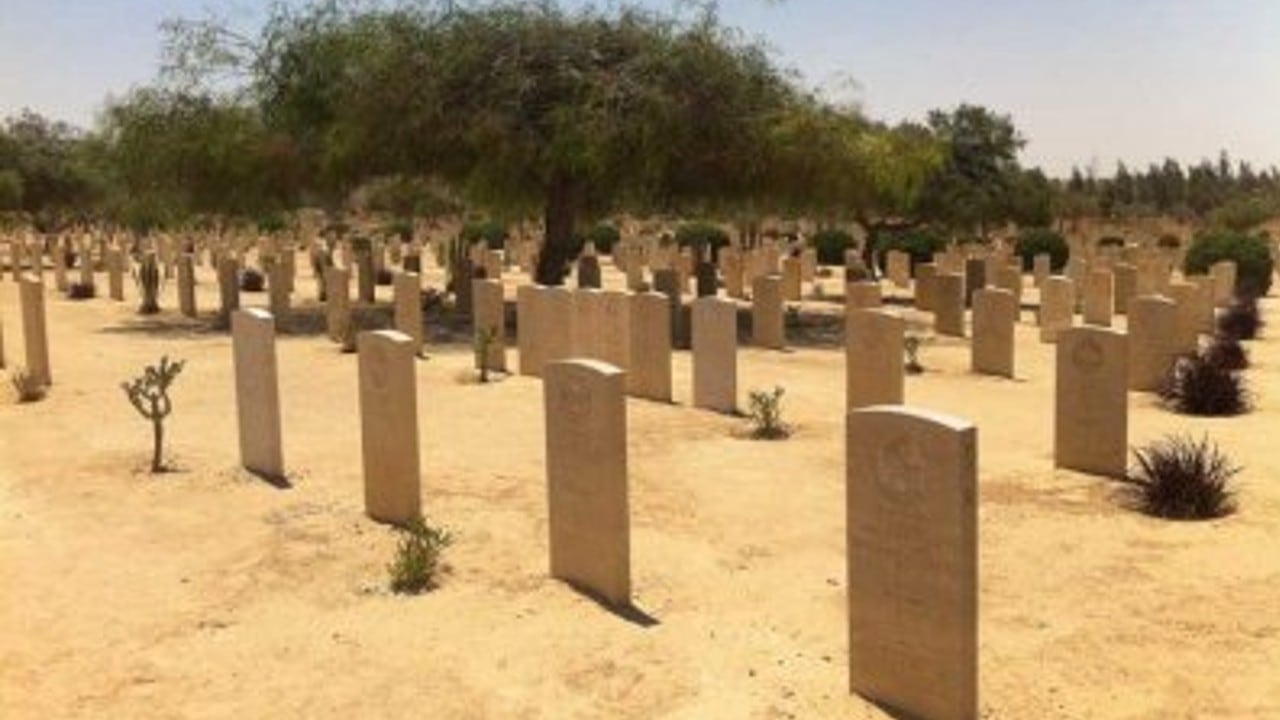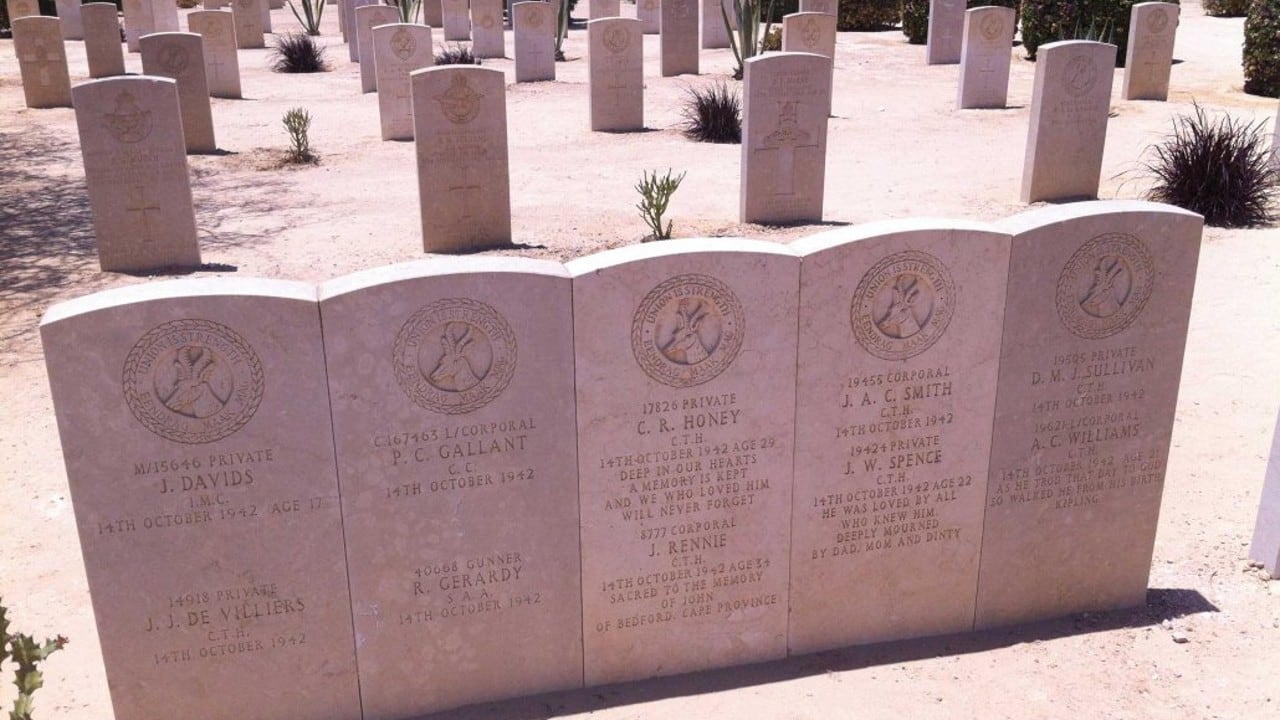It’s impossible to serve in the Middle East without succumbing to moments of ruminative gazing across desert landscapes. Hypnotized by the vastness, wondering what I’m doing here. Feeling exposed.
Significant portions of the seven years I spent living in the region in support of my husband — an Arabic-speaking U.S. Navy foreign area officer consecutively assigned to posts in Egypt, Bahrain, and Qatar — were spent in barren climes, drenched in sweat. My eyes squinting out from behind knockoff souk sunglasses past tan, rocky soil.
Amusingly, the earth in these spaces acts like a sea, reflecting the withering white glare of a sun cheerfully unwilling to hide behind a cloud. Because there are no clouds. Permission to stop and relax here — to, say, cuddle up on a rainy day with a nice bowl of soup — is rarely if ever granted.
This desert demands attention. Concerns for water, safe transportation, and directions are immediate. It’s a landscape totally unlike the soft, seasonal one where I grew up.

Egypt’s deserts in particular have long demanded the attention of men like my husband, white men working in the name of Western governments locked into great power competition. But what is in these deserts for me? I often wondered. Do the experiences or thoughts of those of us adjacent to great power struggles carry relevance?
My husband and I lived for two years in posh districts of Cairo as diplomatic passport holders and the sole Americans in our apartment buildings. He worked out of one of the two towers at the U.S. Embassy downtown, waging daily battles with old versions of Microsoft Excel loaded onto clunky personal computers in a quest to administer the $1.3 billion annual military aid program to Egypt, foreign military financing that began in 1979 after the Camp David Accords and Egypt-Israel Peace Treaty. This is the aid money that cements America’s military-to-military relationship with Egypt, where autocratic presidents like Gamal Abdel Nasser and Hosni Mubarak have arisen from the Egyptian armed forces and have held forth since before my parents were born.
The aid can most easily be understood as a gift card for the Egyptian military to shop at such fine establishments as Boeing, Lockheed Martin, and GE. In addition to F-16 fighter aircraft, M1A1 Abrams battle tanks, and AH-64 Apache attack helicopters, funds also cover maintenance and training of Egyptian military personnel, sometimes in the United States.
I know the gift card spiel is the easiest way to describe U.S. military aid to Egypt because I’ve leaned on it many a time in answering confused American friends who want to know: What am I — and thus we — doing in Egypt?
The U.S. presence is motivated, too, by access to the Suez Canal, which gives commercial and military ships faster routes along which to send warfighters, goods, and oil from east to west or vice versa. Which commodities, after all, would even be worth the quest for faster shipping?
Observing the peace between Israel and Egypt is also on America’s to-do list in Masr, the Egyptian Arabic name for the land of the pharaohs, with a focus on the Sinai.
Europeans, the British in particular, have been in recent centuries similarly interested in Egypt. From the 1880s through the 1950s, the British occupied Egypt in one form or another. In the 1940s, that form was fighting form, battling German Nazis closer to the Mediterranean with one eye trained on the Suez.
Fitting, then, that my husband and I should have stumbled early one Saturday morning smack into the memory of the 7,240 or so British and Commonwealth warfighters buried at El Alamein.

Intellectually, I knew why the cemetery was there; I’d agreed to visit it out of an admittedly bizarre instinct felt by many Americans to visit World War II battlefields abroad — motivated, perhaps, by some kind of obligation to former social studies teachers who gave us extra credit, or a reading of Tom Brokaw’s “The Greatest Generation,” maybe.
But how did these men get here, I wondered from the safety of a shaded portico positioned outside the Al-Alamein Military Museum. In my long sleeves and pants, worn to appease cultural norms as much as to save my pale skin from the sun, I stared at their graves, arranged in rows far more orderly than any other lines I’d seen elsewhere in Egypt. These insignificant tablets of clay jutting out of bone-dry earth seemed mere interruptions in a field of yellow sand.
This country’s museums are generally long on bodies — be they mummified, buried, or plastic mannequins posed in dioramas — and short on informational texts; this one was no different. And none of the grave markers told much of a story about why a bunch of young Australians decided to travel so far to die in an Egyptian desert. Did the mother of this boy from Birmingham, England, know where he is? What about this kid from Pretoria? Did his “beloved Dottie” know he’s out here? Did she ever travel to visit his grave, upon learning of its existence? Did she learn of its existence?
I’m quite certain my mother didn’t know where I was. Yet, ever the rule follower, I did tell the security team at U.S. Embassy Cairo, where we’re posted, that I was out there this weekend, nearly a day’s drive from where my husband was picked up in an armored vehicle each morning near our government-leased Zamalek flat. I joined him and his embassy colleagues several days a week, working in a part-time support role behind bullet-proof glass one block from Tahrir Square.
Neither I nor these boys buried below have any familial or cultural connection to this desert. We’re in no way connected to the generations of people who have lived their lives in and around this space. The Bedouins. Egyptians, Libyans. Somalis.
These war dead and I, we are invaders. But it isn’t us making decisions here, battling through sandstorms as we play bit parts in a larger geopolitical struggle. Are we OK with this? Seems so.

Their struggle involved Sherman tanks sent by Americans, six-pounder guns, and nearly 200,000 men from Australia, Scotland, New Zealand, South Africa, India, Greece, and France lining up across minefields opposite roughly 110,000 Germans, a good number of them in Panzer tanks.
I was warned by guides and signposts alike not to wander off the roads around the museum and cemetery where these men lie. The antitank mines they left remain. Connected by not-as-yet exploded landmines, we military families are.
My own struggles here involved making sense of a modern Egyptian state muddling violently through national crisis, doing so as an idealistic newlywed who was teaching herself colloquial Arabic. I was reading translations of Naguib Mahfouz and coping with Syrian hairdressers who don’t speak English but do claim to know what’s best for my hair. I’d been married to my husband for just more than a year and was still striving to balance my need for independence with a military marriage playing out in a particularly patriarchal part of the world — and one ruled during this transition phase by the SCAF, or Supreme Council of the Armed Forces.
My pursuit of independence within this chaos mostly manifested in traveling solo by Metro around Cairo, a city built for 4 million people but home to roughly 22 million souls. I did this despite warnings from the embassy, attempting some fledgling freelance journalism along the way. Nothing lifted off.
I was beginning to wrestle with inherently contradictory phrases like “military diplomacy” and learn what exactly the State Department does at its embassies. Spoiler: less than previously imagined. I was holding a security clearance for the first time in my life. As a former newspaper reporter and nonprofit staffer, I enjoyed the chance to peek into what the U.S. government gets up to abroad, to see “the other side.” I was listening to classified meetings and hearing dinnertime analysis of how the State Department works with the Department of Defense (or rather, doesn’t). I learned about the American nonprofit workers being sheltered in our embassy because the Egyptians believe them guilty of sowing insurrection.
I watched Coptic Christians pray inside a Cave Church to which they ascribe a supernatural history for the election of the Muslim Brotherhood. The faster they’re put in power, my Christian language teacher told me on a weekend trip with her family to the Red Sea, the faster the world will see them for what they are.
I watched my husband serve as an election monitor alongside Jimmy Carter, celebrating Egyptians voting for the first time in their lives. Forty percent of the electorate was illiterate, so the ballots here featured symbols next to each candidate’s name.
Once Mohamed Morsi was declared the winner, more fights about judiciaries and constitutions arose. So did more burqas on the Metro, a bit of a bummer to my eyes, which love looking over the millions of bright, cheerful hijab on these streets. Conservative Islamists were appointed even to lead governates like Luxor that survive on tourism from the West and Russia. Problems arose instantly in this odd marriage, given the role militant Islamists played in a 1997 massacre of tourists in Luxor and their desire to stamp out false idols.

More protests arose; Morsi was given 48 hours to step down. He didn’t. So Abdul Fattah al-Sisi and the Army stepped in, and Morsi was arrested. Jailed. The factions were difficult to keep up with, the unfolding events difficult even for the men in classified meetings to predict.
Not too long after the ouster, I listened as our ambassador instructed political section staff on how to think about local riots stemming from conspiracy theories about Barack Obama’s religious beliefs that jumped like jinn from the desk of a Minnesota congresswoman across the Atlantic and led to Coptic Christians throwing tomatoes at Hillary Clinton’s car during her visit as secretary of state.
Egypt’s transitional leaders and supporters of the Muslim Brotherhood struggled for influence, fighting proxy battles that seemed to my untrained eye to involve co-opted street protestors and low-level police.
I watched as my husband’s military colleagues reeled off puns over beers at the embassy clubhouse about the coup, which we may never formally call a coup, because to do so would prompt the U.S. Congress to take away the gift card. It was entirely, they say, uncoup.
What now do I think of this “other side”?
I gaze out in silent wonder at the desert once again, alone during a dawn cab ride to the commercial flight the U.S. State Department has chartered me out of the country as part of its 2013 mandatory evacuation of nonessential Americans.
What I’ve learned is that it doesn’t matter what I think.
Kathlyn Clore is an award-winning journalist based in Honolulu, Hawaii. Her work has appeared in Honolulu Family Magazine, SFGate, Generations Magazine, and Parents Magazine. She formerly worked as an editor at the European Journalism Centre in Maastricht, the Netherlands. A military spouse, she has flown solo with her two children across too many oceans to count. She has extensive wish lists on Airbnb and loves taking her kids to the beach.
Editor’s note: This article was first published in The War Horse. This is an Op-Ed and as such, the opinions expressed are those of the author. If you would like to respond, or have an editorial of your own you would like to submit, please contact Military Times managing editor Howard Altman, haltman@militarytimes.com.



